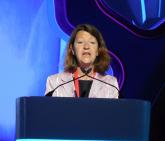Conference Coverage

A Fib ablation surpasses drugs for improving quality of life
Treatment of paroxysmal or persistent atrial fibrillation with ablation led to a significantly better improvement of quality of life compared with...

The results of several studies have shown that patients with both atrial fibrillation and heart failure have about a 40% increased mortality, compared with heart failure patients without atrial fibrillation.
Five prior randomized controlled trials assessed the impact of AF ablation, compared with rate or rhythm control, in heart failure patients. But unlike CASTLE AF, all the prior studies used freedom from AF as the primary endpoint.
CASTLE AF is novel in having total mortality and heart failure hospitalization as the primary endpoint for AF ablation and showing a significant improvement for these effects. But the study design and enrollment raise many questions about the generalizability of the findings.Enrolled patients were symptomatic from AF. Would asymptomatic patients get the same benefits? All enrolled patients had failed prior antiarrhythmic treatment or were intolerant or unwilling to take it. Does this mean the trial enrolled patients who generally were unresponsive to antiarrhythmic drugs, thereby skewing the results toward worse outcomes in control patients? Also, the 5-week run-in period used before randomization may have shifted enrollment toward patients well suited to ablation. The enrolled patients were also relatively young (averaging 64 years of age), and about 60% were New York Heart Association functional class II. A minority had longstanding AF. Were these younger and healthier patients better able to tolerate ablation? And can centers with less experience performing ablations have similar results?
The CASTLE AF results suggest that the time has come to offer AF ablation to patients with heart failure with reduced ejection fraction and AF, but we must be careful to select patients who are similar to the ones enrolled in this trial.
Carina Blomström-Lundqvist, MD, an electrophysiologist at Uppsala (Sweden) University Hospital, made these comments as designated discussant for the report. She has received research funding from Medtronic and Cardiome, and she has received honoraria from Biotronik, Bayer, Bristol-Myers Squibb, Medtronic, Merck, Pfizer, and Sanofi.
AT THE ESC CONGRESS 2017
BARCELONA – In patients with heart failure with reduced ejection fraction who also have atrial fibrillation, catheter ablation of the arrhythmia produced significantly improved long-term survival and a significant reduction in heart failure hospitalizations, in results from a multicenter randomized trial with more than 350 patients.
During 5-year follow-up, heart failure patients who underwent an ablative procedure for their atrial fibrillation (AF) had a statistically significant 37% lower rate of the combined primary endpoint of all-cause death or hospitalization for worsening heart failure, compared with control patients managed by standard medical therapy, Nassir F. Marrouche, MD, said at the annual congress of the European Society of Cardiology. The results also showed significant reductions from ablation, compared with controls, for the individual secondary endpoints of all-cause mortality, heart failure hospitalizations, cardiovascular mortality, and cardiovascular hospitalizations, said Dr. Marrouche, a professor of medicine and electrophysiologist at the University of Utah in Salt Lake City.
“This is the first study to look at the effect of catheter ablation of AF on mortality and heart failure hospitalization” in heart failure patients. “The results should encourage us to perform ablations in these patients,” Dr. Marrouche said in an interview.“Catheter ablation of atrial fibrillation is already done in heart failure patients, but now we have added information that this treatment may not just improve AF symptoms but also lead to a significant improvement in prognosis,” said Johannes Brachmann, MD, a coinvestigator on the study and professor and chief of cardiology at Coburg (Germany) Hospital.
The CASTLE-AF (Catheter Ablation vs. Standard Conventional Treatment in Patients With LV Dysfunction and AF) trial was investigator initiated and run at 31 centers in nine countries. The study randomized patients with paroxysmal or persistent AF and heart failure with a left ventricular ejection fraction of 35% or less. All patients also had to have failed treatment with, been intolerant of, or refused treatment with at least one antiarrhythmic drug, and they had to have been implanted with either an implantable cardioverter defibrillator or a cardiac resynchronization therapy and defibrillation device. The researchers randomized 179 patients to catheter ablation by pulmonary vein isolation, and 184 patients to either a standard rate or rhythm-control regimen plus anticoagulation to prevent ischemic stroke.
The ablation procedure also cut the average AF burden by more than half, compared with medical therapy throughout the 5-year follow-up, Dr. Marrouche reported.
The results “support the need to monitor patients with heart failure for atrial fibrillation,” Dr. Brachmann said in a video interview. This means broader use of monitoring technologies to diagnose AF in heart failure patients, such as implanted loop recorders or implanted rhythm devices.
The prevalence of atrial fibrillation in patients with heart failure with reduced ejection fraction can run 30% or higher. In patients with NYHA class IV heart failure, the AF prevalence is about 50%, Dr. Brachmann said.
CASTLE AF was funded by Biotronik. Dr. Marrouche has been a consultant to and received research funding from Biotronik and from several other companies. Dr. Brachmann has been a speaker for and has received research funding from Biotronik and from Abbott and Medtronic.
On Twitter @mitchelzoler

Treatment of paroxysmal or persistent atrial fibrillation with ablation led to a significantly better improvement of quality of life compared with...
